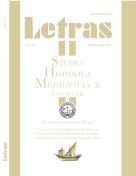Please use this identifier to cite or link to this item:
https://repositorio.uca.edu.ar/handle/123456789/3883| Título: | Silencio, oralidad y escritura medieval : la realización de la corporeidad femenina en el Libro de Apolonio Silence, orality, and medieval writing : the realization of the female corporality in the Libro de Apolonio |
Autor: | Koch, Jezabel | Palabras clave: | LITERATURA ESPAÑOLA; LITERATURA MEDIEVAL; POEMAS; ANALISIS LITERARIO | Fecha de publicación: | 2016 | Editorial: | Universidad Católica Argentina. Facultad de Filosofía y Letras | Cita: | Koch, Jezabel. “Silencio, oralidad y escritura medieval : la realización de la corporeidad femenina en el Libro de Apolonio” [en línea]. Letras, 73 (2016). Disponible en: https://repositorio.uca.edu.ar/handle/123456789/3883 | Resumen: | Resumen: Sabido es que una de las cualidades que caracteriza al Libro de Apolonio, poema castellano en cuadernavía del siglo XIII, es el nuevo tipo de ejemplaridad que promueve, religada por la crítica a una “heroicidad del saber”. Ejemplaridad que pareciera entronizar la sapientia por sobre una fortitudo desmerecida, erigir la erudición escolar relativa al intelecto por sobre la fuerza que supone un poder ejercido por el cuerpo. Sin embargo, al hacer foco no ya en el héroe homónimo del libro, sino en los principales personajes femeninos, la idiosincrasia de este saber se resignifica. A la luz del cuerpo femenino, de sus modos de ser, actuar y proceder, el saber cobra materialidad, se imbrica en el cuerpo, hunde sus raíces en lo físico. Es decir, se instituye dialécticamente en su relación con la naturaleza corporal. Dibujarle un espacio a este saber que impacta en el cuerpo, que impacta en la cotidianeidad y que por ello mismo cobra materialidad es la propuesta del presente trabajo. Un saber que no es inocente, puesto que el cuerpo nunca lo fue, pero que se corresponde con un mirar más humano, tan propio del siglo XIII. Abstract: It is widely known that one of the main peculiarities of Libro de Apolonio, a Castilian poem of the thirteenth century, is the new type of exemplariness that it promotes, bound by the critics to an “heroism of knowledge”. Such exemplariness seems to enthrone sapientia over an unworthy fortitudo, to raise the academic intellectual erudition over the strength that comes from the power exerted by the body. Nonetheless, moving the focus from the hero that gives name to the book to the main female characters, the idiosyncrasy of this knowledge exposes a new meaning. Through the female bodies, their ways, acts and proceedings, knowledge becomes a material subject, takes over the body, sinks its roots in the physical plane. In other words, it institutes dialectically itself in its relation with the corporal nature. Making room for this knowledge that impacts the body, that affects everyday living and, due to that matter, becomes material, is the purpose of this work. A non-innocent knowledge located in the body body, which never was so, a more human point of view, so characteristic of the thirteenth century. |
Cobertura Espacial: | SIGLO XIII | URI: | https://repositorio.uca.edu.ar/handle/123456789/3883 | ISSN: | 0326-3363 | Disciplina: | LITERATURA | Derechos: | Acceso Abierto | Fuente: | Letras Nº 73, 2016 |
| Appears in Collections: | LETRAS - 2016 nro. 73 |
Files in This Item:
| File | Description | Size | Format | |
|---|---|---|---|---|
| silencio-oralidad-escritura-medieval.pdf | 74,45 kB | Adobe PDF |  View/Open |
Page view(s)
152
checked on Apr 30, 2024
Download(s)
83
checked on Apr 30, 2024
Google ScholarTM
Check
This item is licensed under a Creative Commons License

